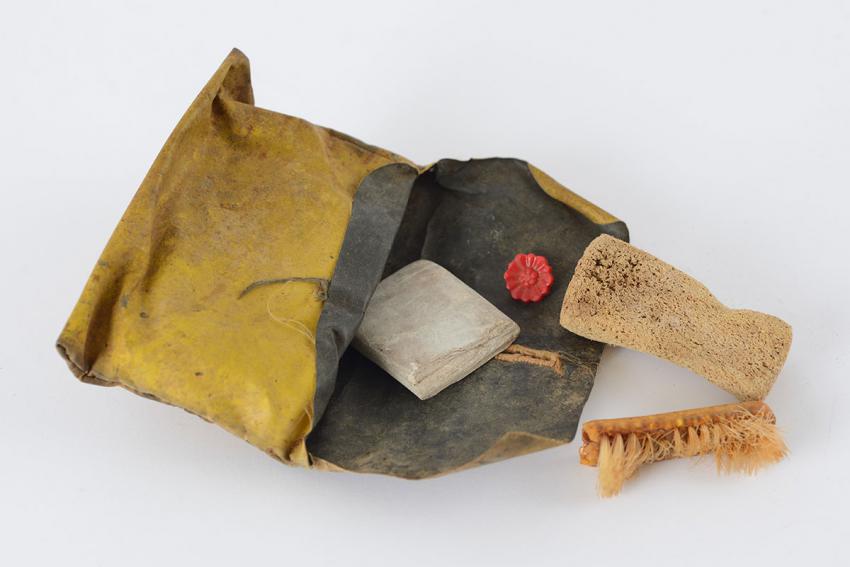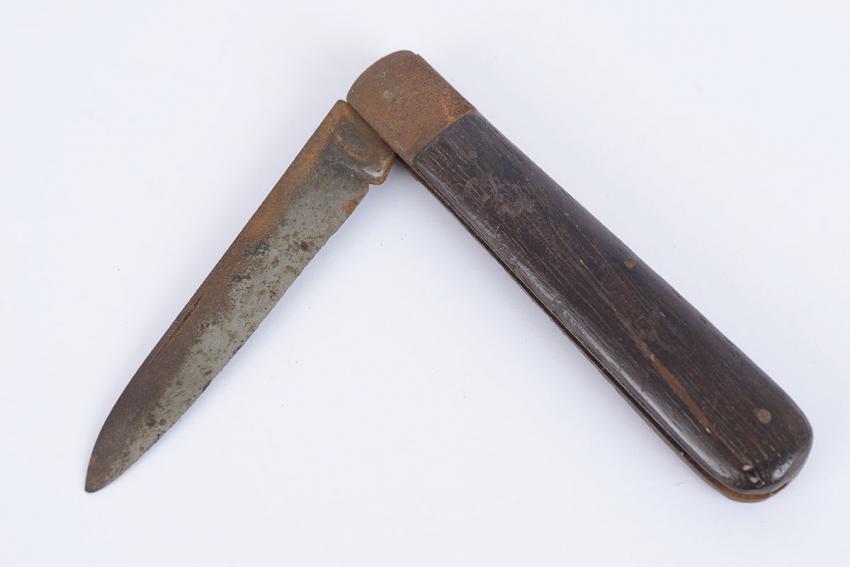
Yad Vashem Artifacts Collection
Donated by Buki Greenberg, Beit Herut


Yad Vashem Artifacts Collection
Donated by Buki Greenberg, Beit Herut

Sunday to Thursday: 09:00-17:00
Fridays and Holiday eves: 09:00-14:00
Yad Vashem is closed on Saturdays and all Jewish Holidays.
Entrance to the Holocaust History Museum is not permitted for children under the age of 10. Babies in strollers or carriers will not be permitted to enter.

Yad Vashem Artifacts Collection
Donated by Buki Greenberg, Beit Herut


Yad Vashem Artifacts Collection
Donated by Buki Greenberg, Beit Herut

"…You see here what I brought from Auschwitz. Today it looks like nothing but it was something very precious. You couldn’t acquire it with money. There is a spoon here – who had a spoon? They would eat like this, drink from the utensil, from a piece of tin…I had a spoon, I was rich…
And I had soap – this is what we were given – the piece of soap that I took with me through Auschwitz, through Ravensbrueck, via Neustadt-Glewe to Tel Aviv… This is a small sponge here that I would wash with…I was very rich.
There is another very important item in this paper – there is lipstick that I received a small piece of from Roshke Spinner... I was with my mother the whole time, and before a selection I would want my mother to look healthy, so I would rub some on her lips and cheeks so she would look healthy… Here there are the remains of a brassiere that today would fit a baby… but it fit me because I weighed 36 kilograms and it also saved me…"
Rivka Mincberg was born in 1924 to a well-off, Zionist family in the town of Starachowice (Wierzbnik), Poland. After the Nazi occupation a ghetto was set up in the town, and most of the residents were eventually deported to the Treblinka death camp.
The members of the Mincberg family were assigned to forced labor in the Hermann Goering Werke ammunition factory, along with some 1,200 people from the town. When the labor camps in the area were liquidated during 1944, the prisoners were sent to Auschwitz-Birkenau.
On their arrival at the camp, Rivka and her mother Machla met Roshke Spinner-Liebeskind, who had been Rivka's counselor in the Akiva youth movement and active in the HeHalutz HaLochem underground in Krakow. Roshke's husband, Dolek Liebeskind, the underground leader, had been killed in 1942 in a battle with German Army forces.
Roshke continued her underground activities in Birkenau too. Thanks to her status in the camp and her work in "Kanada" (the camp storehouse area), she managed to house Rivka and her mother in a block with other girls from the youth movement who were also active in the underground, and she equipped Rivka with shoes and a pocketknife. "If you get sent to the gas chambers," she advised Rivka, "you should stab a Nazi officer before you go to your death." Rivka hid the pocketknife in her shoes.
During her time in the camp, Rivka managed to "organize" a number of items for herself. These precious items were found by her children after her death. In the testimony she gave to Yad Vashem Rivka talks about these items: a sponge, a toothbrush, a spoon, a tiny piece of lipstick, a little sugar and salt, which she wrapped in small pieces of cloth.
When the Auschwitz-Birkenau camp was evacuated on 18 January 1945, Rivka and her mother were sent out on a death march in separate groups. Rivka was marched for three days until her group arrived in Gleiwitz, and from there the prisoners were sent by train to the Ravensbrueck camp. Rivka never saw her mother again.
In March 1945, Rivka was sent to the Neustadt-Glewe camp which she referred to as the "camp of corpses”. Her close friend perished there, and Rivka was left entirely alone. She would scrape some nourishment from potato skins with her pocketknife in order to survive. For her, "Liberation Day" was miserable. "I had nothing to rejoice over."
In the summer of 1945, Rivka returned to Poland. At the train station she was informed that her father had survived and when she heard the news, she fainted. Her brother Mundak also survived thanks to the Aryan papers he had managed to obtain. However, their younger brother Nechemia did not survive the hardships of the war.
Forty-eight years after the end of the war, Rivka received the news that the diary she had kept in the Majowka camp had been found under her mattress by a Polish man who had kept it throughout the years. In the diary there were also family photographs. On his deathbed, the man had entrusted the diary to his son who had made great efforts to find the writer of the diary. The diary has been preserved in the Yad Vashem Archives.
Yad Vashem Artifacts Collection,
Donated by Buki Greenberg, Beit Herut

Thank you for registering to receive information from Yad Vashem.
You will receive periodic updates regarding recent events, publications and new initiatives.

"The work of Yad Vashem is critical and necessary to remind the world of the consequences of hate"
Paul Daly
#GivingTuesday
Donate to Educate Against Hate


Worldwide antisemitism is on the rise.
At Yad Vashem, we strive to make the world a better place by combating antisemitism through teacher training, international lectures and workshops and online courses.
We need you to partner with us in this vital mission to #EducateAgainstHate
The good news:
The Yad Vashem website had recently undergone a major upgrade!
The less good news:
The page you are looking for has apparently been moved.
We are therefore redirecting you to what we hope will be a useful landing page.
For any questions/clarifications/problems, please contact: webmaster@yadvashem.org.il
Press the X button to continue



